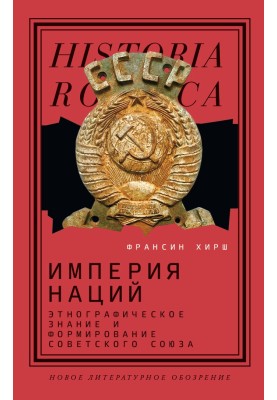Empire of Nations. Ethnographic knowledge and the formation of the Soviet Union
 Instant download
Instant download
after payment (24/7)
 Wide range of formats
Wide range of formats
(for all gadgets)
 Full book
Full book
(including for Apple and Android)
Empire of Nations, published in English in 2005, has already earned the status of a classic study on the history of Soviet national politics. Francine Hirsch traces the interaction of power and expertise in the process of state building, showing the contributions of ethnographers, anthropologists, geographers, linguists and other specialists in the formation of Soviet ideas about nation and race, as well as the development of the very principles of the USSR as a multinational state. It was from experts who had pre-revolutionary training and relied on Western European ideas that specific forms of state policy in relation to certain peoples depended in the 1920s and 1930s. Based on extensive archival research, the author shows how, through planning and conducting censuses, mapping, and creating museum exhibitions, the general ideas of the Bolsheviks crystallized into political decisions. The European idea of cultural evolutionism, the Marxist theory of staged development and the Leninist idea of the ability of a revolutionary party to accelerate historical development became the basis of the state policy of integrating different peoples and cultures within the framework of the Soviet project.
Data sheet
- Name of the Author
- Франсин Хирш
- Language
- Russian
- Translator
- Роберт Уралович Ибатуллин
Reviews
Глибоке та інформативне дослідження
Книга "Імперія націй" Франсін Хірш є вражаючим внеском у вивчення радянської національної політики, що відкриває нові горизонти розуміння складних процесів, які відбувалися в СРСР. Автор майстерно простежує, як експертне знання етнографів, антропологів та інших фахівців впливало на формування радянських уявлень про націю та расу. Книга сповнена глибоких архівних досліджень, які демонструють, як планування переписів, картографування та створення музейних експозицій стали інструментами для реалізації політики більшовиків. Хірш вміло поєднує теоретичні концепції культурного еволюціонізму та марксизму з практичними аспектами державного будівництва, що робить цю книгу не лише академічно цінною, але й надзвичайно цікавою для широкого кола читачів. Вона спонукає до роздумів про складність і багатогранність радянського проекту, а також про те, як наукові знання можуть впливати на політичні рішення. Рекомендую всім, хто цікавиться історією, соціологією та політикою













